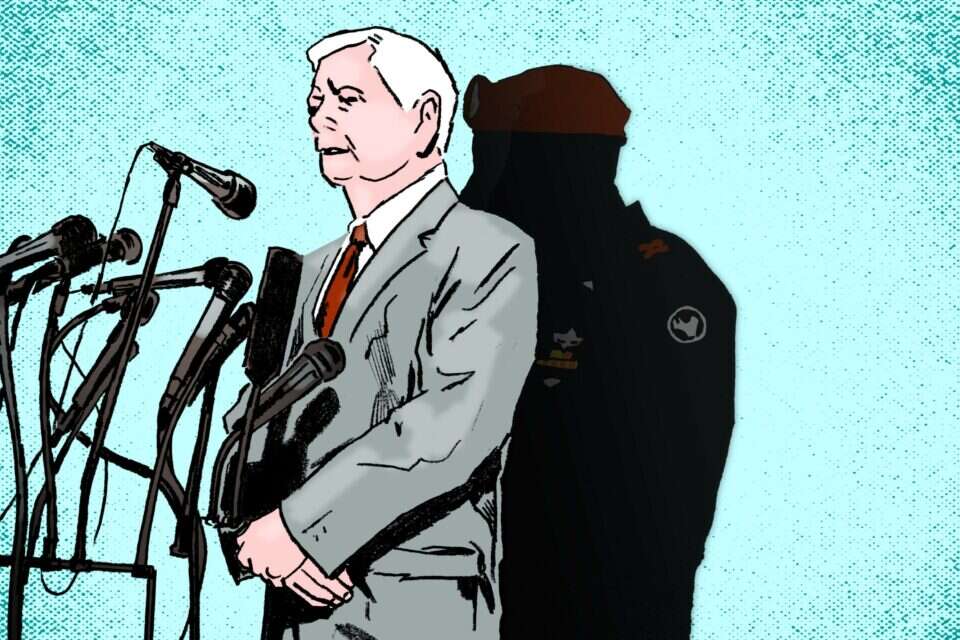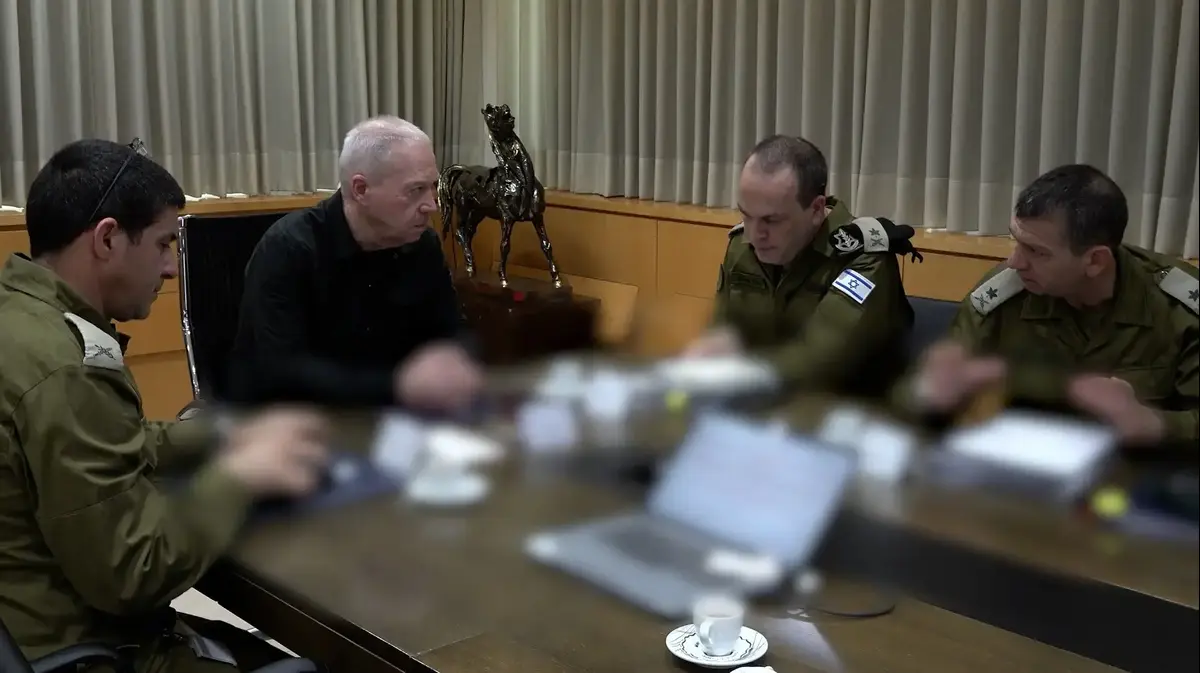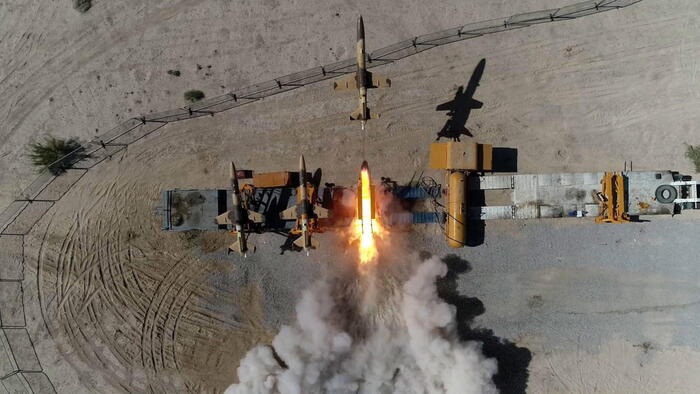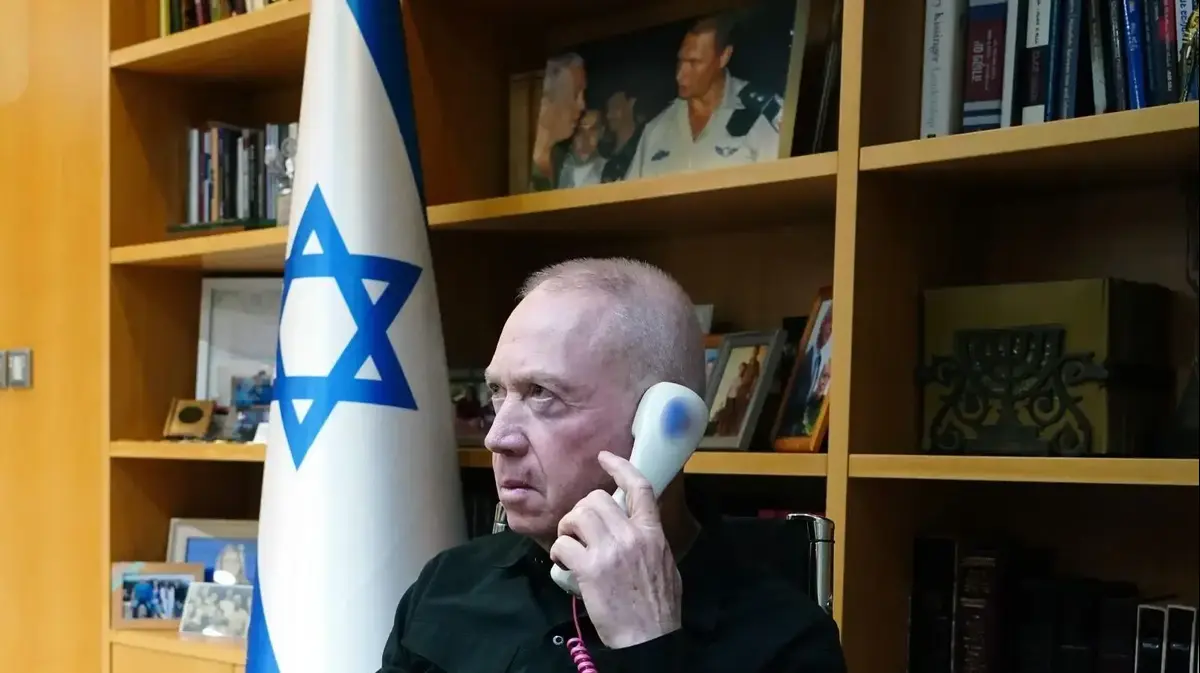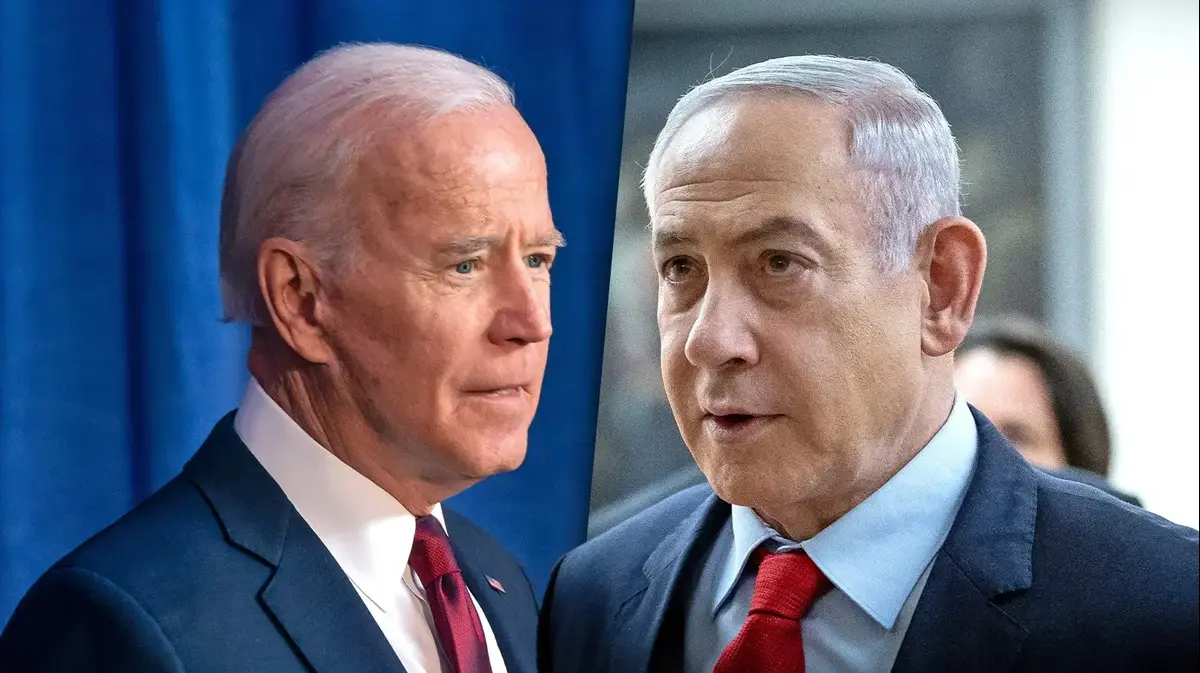The relationship between the military and the political level began in Israel as early as 1920, with the establishment of the Histadrut and the Defense Organization.
There was no doubt.
The civilian political leaders lead, and the security personnel and security organizations are subject to their authority and discipline.
But the civilian authority towards the "army men", as it was then under underground conditions, was embodied in the party and its power.
There was still no authority of a constitution and state.
As far as is known, the first to recognize some kind of dividing line, not to mention a potential fault line, between the political leadership of the Jewish settlement and the layer of security personnel, was Uri Avneri.
It was not after the establishment of the state in the 1950s, but a few years before the establishment of the state, in the midst of World War II.
He described the political elite in the settlement, headed by Ben-Gurion, as the "Sect of the Gabbaim", "the privileged status of the exile ghetto, (the sect) began to move its circle of activity to the newly created fertile territory in the country," Avneri wrote in an article called "The Prospects of the Military Dictatorship" in the newspaper "The Observer" in 1943.
"We will also have a military element with power and self-awareness on the day of the armistice, an element that will demand, and demand rightly, that the hand that pulled the trigger will also be the hand that steers the wheel."
Things developed so that a little more than 40 years later it was already possible to predict in advance that a certain senior officer would be prime minister in the future.
It was Ehud Barak, who in 1986 was still champion.
In the "News" newspaper, the editors decided to put together a political scenario looking ten years into the future.
"I prepared a script for the question of who will head the Likud in a decade, Netanyahu was then the ambassador to the United Nations and my assessment was correct, because I thought that the personal issue would take hold and he would win over the Likud princes.
Regarding the Labor Party, the thought was that the party prefers Chiefs of Staff", said the mythological commentator Hanan Kristal upon his retirement to Dodi Fatimer in Maariv.
"From Moshe Dayan and Bar-Lev to Yitzhak Rabin, that's why I thought that the Labor leader would come from the army... Barak was then the commander of the Central Command, and we estimated that he would be elected Chief of Staff and that after the Rabin-Peres period he would be the Labor leader." That is to say, a political commentator who is not an expert In the IDF and in security, he was able to give a forecast for another five years, according to which a certain general would advance and later become the Chief of Staff. At that time, the Chief of Staff was Lt. Col. Moshe Levy, and a year later he was appointed to the position of Dan Shomron.
But to understand processes in the IDF and in politics, you can go back much further. Dr. Uri Milstein was the first to define the IDF patrol as a mechanism for creating an elite. About 22 years ago, when I did a profile article on the unit's founder, the late Col. Avraham Arnan , Brigadier General (Res.) Dubik Tamri spoke in similar terms. He did not say this explicitly, but claimed that Arnan saw the patrol as a kind of continuation of the Palmach, and Rehabam Zeevi (Gandhi) told me that it was significant that Arnan's military origin was from the 4th Battalion of the Palmach, which was the leading battalion under the command of the son of the spiritual father, Yosef Tevankin. "At the beginning of 1964 three things happened (that determined the future).
Yitzhak Rabin was appointed as Chief of Staff, Aharleh Yariv as head of the AMN, and I was appointed as commander of a General Staff patrol," Tamari said modestly.
He, and later Ehud Barak, walked around with the Chief of Staff's baton in their pockets even when they were captains and rabbi captains. And Barak was labeled as a leader who was in a dimension beyond the military command by Haim Guri, who was present at the obituary that Barak gave for Yoni Netanyahu on the 30th day of his death in 1976. The precedent of the Chief of Staff being appointed as Prime Minister was set by Yitzhak Rabin in June 1974.
A sect of collectors
Something has changed in the last decade or 15 years that did not exist until then, even when chiefs of staff and senior champions were dropped straight into politics and into the chairs of ministers in the government. A generation of retired chiefs of staff began to see the political leadership as a sect of swindlers, led by a corrupt prime minister , and their role is to introduce the well-known elements of "honesty", "order" and "cleanliness".
The founding father David Ben-Gurion was afraid of the army even when his assessment of their professionalism was low.
What is a fear that can happen, there is no explicit verbal expression for this.
But there are signs of his concerns in his confrontation with the Palmach, and especially in a specific meeting with Yigal Alon a few days before the Altalana affair took place in June 1948, in the midst of the War of Independence. Prof. Zaki Shalom, who researched the issue, wrote that "among his men (of the Palmach ) highlighted, as far as one can get an impression, a sense of 'uniqueness' that requires a different attitude. Against this background, it is possible to understand the difficulty of the Palmach to adapt to the new reality (following the establishment of the IDF), which Ben-Gurion sought to impose during the war."
Uri Avneri // Photo: Meir Partosh,
"During the conversation with Yigal Alon, BG severely criticized the acts of looting and destruction carried out by the Palmach in Jerusalem," Shalom continues in a large article in the 2002 "Eyonim Bat Tokomat Yisrael" magazine. "B.G. had serious concerns mainly about the formation of a strong military force in the country, which will not be given despite the civilian rank..."
In the conversation with Alon, it seems that BG aims to tattoo the sense of uniqueness and vocation of the Palmach; after all, the Palmach invented the purity of weapons and the morality of fighting and the purity of morals and what not.
So here it is, looting in Jerusalem, following which BG orders even to shoot the Jews to prevent intrusion into the Old City and holy places for Christians and Muslims.
Uri Avneri recognized in 1943 what was about to happen in Israel: "We will also have a military element with power and self-awareness, which will demand, and demand rightly, that the hand that pulled the trigger will also be the hand that steers the wheel."
Yigal Alon was released with the rank of major general and a few years later, in the 1955 election campaign, he headed the campaign of his party, Ehadot Havod, which was designed to tarnish the image of Prime Minister Ben-Gurion: "The political leadership squandered our military victory and led to retreats and failures."
To raise our own commanders
Indeed, I have heard many times from Prof. Yechiam Weitz that Ben-Gurion was troubled by the feeling that the war of independence or liberation is written in the name of the commanders of Mapam. As it were, it is not his. These are Yigal Alon and Shimon Avidan, Moshe Carmel, Mola Cohen, Yitzhak Sade and the rest The Sinai war was "his" war. Beyond trying to build his moral authority towards the security personnel, he sought to cultivate Mapai's commanders.
Mapam's main political opponent was not Herut or the right, but Mapai, which also fought the communists more than the right.
He found such commanders in the form of Moshe Dayan, who jumped from lieutenant colonel to general and from there to chief of staff, and Arik Sharon, who belonged to a different generation.
Netanyahu in a meeting with soldiers in the Northern Command, 2018 // Photo: Eyal Margolin - Gini,
Another military figure he saw in the political dimension was Assaf Simhoni.
About two months before the Sinai War, Col. Shimhoni was appointed to the position of General of the Southern Command. As a lieutenant colonel in the position of General of the Command, he led the Sinai system in October-November 1956. A few days after the end of the campaign, he was killed in a light plane accident that he was piloting himself. Like Dayan, he too was from a family A well-known and rooted Pa'inaikit.
After his death, there was an argument between BG (Prime Minister and Minister of Defense) and Chief of Staff Moshe Dayan.
Ben-Gurion wanted to promote him in rank after his death, to general;
Dayan objected, probably rightly so.
It is customary in the IDF to promote a commander who fell in battle and distinguished himself, especially if he held a position equal to the rank after his fall - MP in the rank of lieutenant who is promoted to captain.
Or a major promoted to lieutenant colonel.
The argument between BG and Dayan, as far as is known, has no documentation and the investigators heard about it from an officer who was close to Dayan at the time.
BG forced his will, and at Assaf Simhoni's funeral he embraced him with great love and called him "the champion of victory".
Yigal Alon, who was discharged with the rank of general and in 1955 headed the "Labor Unity" campaign, which was designed to tattoo the image of Prime Minister Ben-Gurion: "The political leadership squandered our military victory and led to retreats and failures"
What would have happened to him if he hadn't been killed in such a senseless way?
He was about Rabin's age.
Was just 34 years old when he was killed.
He was probably destined to advance further in the IDF and move to the political party ranks. He had a chance to become Chief of Staff after Laskov.
Avneri Tzedek was right
At that time, Uri Avneri once again observed a process of strengthening of the security establishment and the military elite in relation to the party's civilian ranks.
You can define him as an adventurous commentator, but the fact is that, looking back, Avneri correctly identified what was about to happen in Israel.
He stated that a military coup cannot be carried out, but the senior security officials will take over parties from within.
Avneri described the familiar mindset using events from Greece: "What would happen if Yigal Yedin resigned from his position tomorrow morning, stood before the people and said: The parties are destroying the country. Narrow-minded politicians are enslaving the affairs of the nation to their selfish interests. The time has come for all willing patriots The best will coalesce into one big movement around the Chief of Staff, a movement that will not be a party like all the parties but an organization to save the country.
In Israel, such an act provoked... great embarrassment."
But today such words and demagogic slogans guide retired senior officials and leaders who seek to rebuild from the collapse of the traditional political system.
Only unity, without competition of ideas and voting, without political rivalry, neither right nor left.
Back in 1997, years after the consistent infiltration of generals, chiefs of staff and security officials into the political system, the late Prof. Moshe Lisk stated that there is no "militarism" in Israel. He claimed that in a militaristic society there is a particularly offensive security theory, based on an aspiration for territorial expansion that is not related to self-defense Another condition: "that the military establishment is a source of inspiration and authority (formal and informal) for the political decision-makers over time." Also, "the military in such a society is the supreme regulator and directer of social norms in most institutional fields." He claimed that this does not exist in Israel, where there is "A diverse and heterogeneous military elite in terms of political and cultural orientations." He mainly pointed to "pluralism within the IDF itself, and especially in its higher ranks... a trend of conceptual heterogeneity within the IDF." In such a situation, a unified position cannot be formed on any military strategic issue At the General Staff and the rest of the senior officers.
The leadership of the Blue and White party in Kibbutz Kfar Gaza, 2019,
Today the situation is different.
"The right-wing governments have an ideology, so they sometimes act against the army's position. The army, with great courage, presents the truth to the government, but in the end the army cannot replace the statesmen or the people."
This is what Major General (Ret.) Noam Tivon said in May 2016. He added the assessment that is probably accepted by the military elite at that time and now: "It is necessary to end the conflict, it is in the first interest."
1999 was similar to what is known from recent years.
Together with the former Chief of Staff headed by Labor, former Chief of Staff Amnon Lipkin-Shahak and General Itzik Mordechai entered the political cauldron.
The ultimate goal:
overthrowing Netanyahu
Tivon presents two concepts, which are probably rooted in the minds of the generals of the General Staff: one, "we, the army, represent the truth". In contrast to the government, which represents "ideology". The second, that there is a uniform and uniform perception at the top of the IDF on the cardinal issues, and especially on the Palestinian issue.
This is the opposite of what Lisk claimed.
Today's political situation originates, in part, from the new self-perception of the military elite, of superiority over the political echelon.
The Six Day War was a landmark, a ray of light in the darkness of the Cold War;
A democratic country knows how to fight back and defend itself against a Soviet-Arab alliance whose platform is totalitarian values and the destruction of a free society like Israel.
The position of the IDF was expressed in the common saying "All the best to the IDF".
But one of the negative contributions of the war was the penetration of the "Champions of Victory" into the political elite.
This is how we got Yitzhak Rabin, Haim Bar-Lev, Ezer Weizman and Eric Sharon at the top of the major parties.
Moshe Dayan became the charismatic figure that frightened the leadership of the formation (Mapai, the Labor Party). In the years 1968-1969, the movement "For Moshe Dayan for the Prime Ministership" was active, there was a mass signing and Golda Meir claimed that this was an anti-democratic move. But from the moment she became prime minister The government functioned in coordination and closeness even with Moshe Dayan, who received its authority.
The culmination of the process is the establishment of the Blue and White Chiefs of Staff party in 2019, with at least three chiefs of staff: Gabi Ashkenazi, Benny Gantz and Bogi Ya'alon.
Ehud Barak and Yair Golan, who was the Deputy Chief of Staff, joined the same list with Meretz
The supremacy of the party was manifested in the fact that even the seemingly omnipotent Minister of Defense was forced to accept the appointments of the Chiefs of Staff that Eshkol, and after him Golda, cooked up through the personalities from the united kibbutz that Ben-Gurion so loathed: Yigal Alon and Israel Galili, and to them were added the Chiefs of Staff who looked after their successors, Rabin and Bar -heart.
This is how Dedo Elazar was appointed in January 1972, but the appointment was already decided at the end of 1969 when he was appointed to the position of head of the AGM (number 2 at that time). Major General Ezer Weizman opened a spare parachute and landed directly in the chair of the Minister of Transportation in the government on behalf of Ghal, and Shaika Gabish retired from the army.
The difference between the values of the command at that time and the soldiers of the present can be seen in Dado's words during the war of attrition: "We must see this period as part of the Jewish people's war for a homeland and an independent state."
Ben-Gurion meeting with soldiers near the Gaza Strip, 1957 // Photo: AP
In Benny Gantz and Gadi Eisenkot, the motif of American Jewry appears again and again.
The relationship with American Jewry needs to be cultivated, you hear from Benny Gantz, and the suspicion is that "American Jewry" is a code name for the Democratic Party and the Reformers.
These are not the Jewish people and the homeland that Dado spoke of, who certainly would not have digested the dependence on the security mechanisms of the PLO.
Officers in the political cauldron
Rabin claimed in an interview after the Yom Kippur War that the status of the IDF had declined. The Agrant report created a watershed in the relationship between the political and military levels.
Rabin is also the one who involved the top of the IDF in negotiations with the PLO leadership after the signing of the first Oslo agreement.
The generals and chiefs of staff became invested in the Oslo road. Rabin was, from the point of view of the top of the IDF, a supreme security authority, and not only because of his constitutional role as Prime Minister and Minister of Defense.
It was more and more difficult for them to accept the authority of a prime minister who did not come from within the ranks of the security establishment, especially when it comes to a right-wing prime minister who was in opposition to Yitzhak Rabin.
- 1999 was a picture similar to what we know in recent years.
Together with the former Chief of Staff headed by the Labor Party Barak, former Chief of Staff Amnon Lipkin-Shahak and Itzik Mordechai, who started his career in the Netanyahu government in '96, entered the political cauldron.
The ultimate goal: overthrowing Netanyahu.
The culmination of the process is the establishment of the Blue and White Chiefs of Staff party in 2019. There were at least three chiefs of staff there, Gabi Ashkenazi, Benny Gantz and Bogi Ya'alon.
Ehud Barak and Yair Golan, the latter a general who was the Deputy Chief of Staff, joined the same list with Meretz. Yair Golan expressed himself aggressively in interviews towards the settlers, and I heard him define the cooling-off law for senior military officials as corruption of the political system.
But what these developments marked was the end of the long, historical romance of the Labor Party with the Chiefs of Staff and the retiring generals. In essence, the joining of personalities such as Rabin, Bar-Lev, Mota Gor or Eyal Ben Reuven to the Labor Party, they actually took on the burden of Ideology and civilian party bitterness. Blue and White, which has now evolved into the "state camp", is a different story. This is a military elite that sees itself as integrating itself into the security of Judea and Samaria jointly with the Palestinian security mechanisms. A security elite that is invested in "strengthening" the Palestinian Authority. "The IDF Is expending energy on a war against the weakest enemy in the Middle East in a complex reality that does not allow him to be defeated. This creates a situation in which the small Hamas declares that it is successful in standing up to the large IDF.
It's a deterrent hit.
This is an injury to Israel's image as a victorious country," said Lt. Col. (Res.) Gadi Eisenkot.
Operation "rift"
The ideology that covers these perceptions is that the "internal rift" and Netanyahu are the greatest threat to Israeli society.
In the 1980s and 1990s, a severe attack by the left began against the IDF through legal entities. The view that sees the IDF as a potential threat to democracy and human rights was expressed by Prof. Mordechai Kermanitzer in the introduction to the Hebrew translation of the report on the crimes of the military junta In Argentina authored by the writer Ernesto Sabto under the title "Never Again".
"Maintaining democracy requires, first of all, recognition of the value of the democratic regime as a barrier against the deterioration of atrocities, maintaining the principle of the subordination of the army and other security organizations despite the elected civilian government, inoculation against an ideology according to which the protection of any values, no matter how important they may be, may justify The expropriation of power from the hands of elected politicians - hesitant and compromising - and its transfer to the guardians of the seal of those values - the army and the security services," wrote Prof. Kermanitzer.
"Just as torture is used in the name of protecting the most important of values, so is the elimination or suspension of the democratic regime... for noble purposes - as in the Argentine case... predictions like 'this can't happen in our country' are often dubious, as the murder of Ra taught us "From Yitzhak Rabin.
The cautious assumption must be that there will never be resilience... It would be an illusion to think that shameful atrocities can only be carried out under a military regime," and so on and so forth, one of the senior speakers of the legal elite compares the criminal military regime in Argentina in the 1970s with the military system in Israel .
What Kramnitzer probably didn't know is that the institutionalized left (the communists) in Argentina supported the military junta, which carried out its coup against a populist right-wing government (led by Isabella Peron), which threw Argentine society into chaos, and that great Ernesto Sabato, along with the great writer Jorge Luis Borges, Made a pilgrimage to thank the leader of the junta, General Videla.
The judicial system's lack of sense of proportion, as represented by Kermanitzer, later evolved into the theory that every IDF officer has a small Nazi hidden inside him. Extreme left-wing organizations, backed by lawyers and philosophers, turned IDF senior officers into candidates to be tried in The Hague as war criminals.
Although the military elite did not really raise their hands in the face of the pressure of legal-political warfare, it seems that they compromised and behaved according to the custom "if you can't beat them - join them".
Those academic jurists lack the basic understanding that the Palestinian-Islamist terrorism that Israel is fighting against is part of a strategy to destroy the State of Israel and murder every Jew wherever he is.
In their formal adherence to the "values of democracy" these also infected the military elite, who came today in the name of these values to fight the right, and especially the Likud.
were we wrong
We will fix it!
If you found an error in the article, we would appreciate it if you shared it with us

